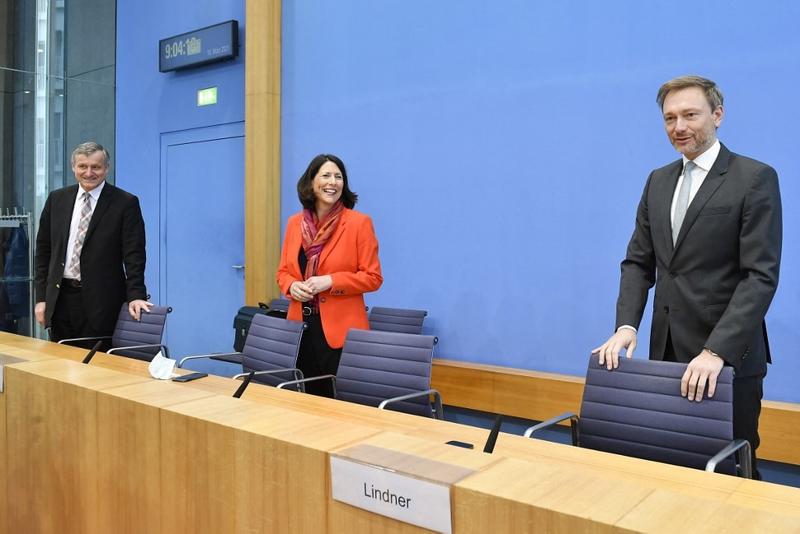 (From left) Hans-Ulrich Ruelke, the Free Democrats' (FDP) top candidate for the regional elections in the southern state of Baden-Wuerttemberg, Daniela Schmitt, FDP's top candidate for the western state of Rhineland-Palatinate, and Christian Lindner, FDP's party leader, arrives for a press conference one day after the regional elections, in Berlin, Germany, on March 15, 2021. (TOBIAS SCHWARZ / POOL / AFP)
(From left) Hans-Ulrich Ruelke, the Free Democrats' (FDP) top candidate for the regional elections in the southern state of Baden-Wuerttemberg, Daniela Schmitt, FDP's top candidate for the western state of Rhineland-Palatinate, and Christian Lindner, FDP's party leader, arrives for a press conference one day after the regional elections, in Berlin, Germany, on March 15, 2021. (TOBIAS SCHWARZ / POOL / AFP)
BERLIN - Germany's liberal Free Democrats, emboldened by gains in a regional vote on Sunday, would not be drawn on Monday on their potential as kingmaker in a national government after the federal election.
Germany holds federal election in September and, with Chancellor Angela Merkel not seeking re-election after 16 years in office, her party suffered historic defeats in twin regional votes on Sunday, already missing the "Merkel bonus" she has brought it with four consecutive national election victories.
Of course we want to govern. But now we have to say: state politics and federal politics cannot be compared one-to-one.
Volker Wissing, Secretary general of the Free Democrats (FDP)
In the southwestern automotive hub of Baden-Wuerttemberg, the business-friendly Free Democrats (FDP) increased their share of the vote to 10.5 percent from 8.3 percent at the previous election in 2016.
ALSO READ: Merkel's CDU suffers record setback in state elections
The gains opened the way for a potential regional alliance of the ecologist Greens, the left-leaning Social Democrats (SPD) and FDP, dubbed a "traffic light" coalition after the parties' colors. Before Sunday's vote, the Greens ruled in coalition with Merkel's Christian Democrats (CDU).
In neighboring Rhineland-Palatinate, which also voted on Sunday, a traffic light coalition was already in power before the election, and could govern again.
"Coalition speculation is too early," FDP leader Christian Lindner said at a news conference in Berlin, referring to September's federal election.
The party's secretary general, Volker Wissing, said the outcome of the regional elections could not simply be transferred to the federal level.
"Of course we want to govern. But now we have to say: state politics and federal politics cannot be compared one-to-one," Wissing, who is also FDP state chairman and economy minister in Rhineland-Palatinate, told broadcaster ARD.
"And it must also be clear to everyone: With the FDP, there will be no shift to the left in Germany," he added.
READ MORE: Regional elections present crunch test for Merkel's party
Merkel's conservative bloc of her Christian Democrats and their CSU Bavarian allies now rule at federal level in a "grand coalition" with SPD.
The CDU/CSU bloc would prefer to rule at a national level with the FDP, but opinion polls show it lacks the support for such an alliance now.
The fractured electoral landscape could open up scenarios such as a CDU/CSU tie-up with the Greens, a 'traffic light' coalition, or an alliance of CDU/CSU, Greens and FDP. Polls do not show enough support for a left-wing combination of Social Democrats, Greens and far-left Linke.


